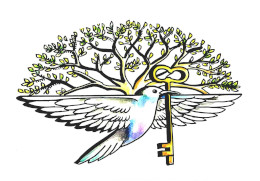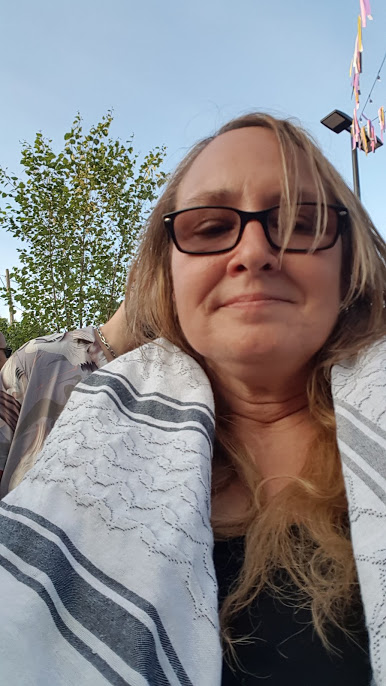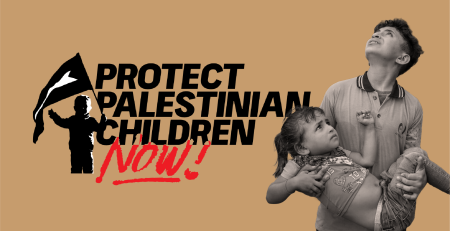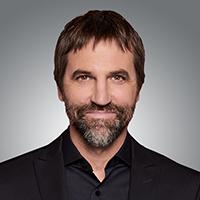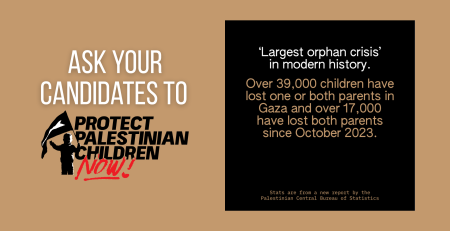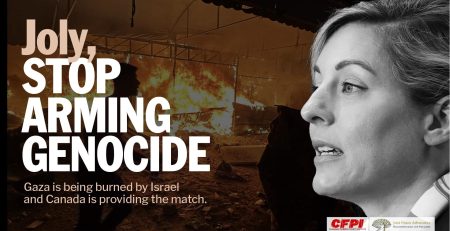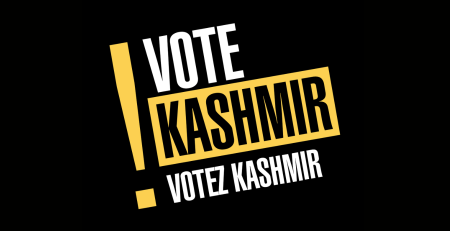Karen Rodman, activist, Canada
Born in the early 1960s in rural Ontario near Toronto, I grew up on a farm. My ancestors on all sides of my family settled in central Ontario as farmers during the early part of the nineteenth century from the British Isles.
I was raised in the United Church of Canada (UCC), the largest protestant denomination in Canada, founded in 1925 from Methodist, Presbyterian, and Congregational roots. The UCC was seen to be progressive from its beginning — ordaining the first woman in Canada in the 1930s, affirming rights of conscience, speaking out with a socialist focus during the depression, supporting the founding of public medicare, and so on.
In the 1960’s, the UCC was looked to as the voice of much of Canada, with over 95% of population being Christian, about half Reformed and half Catholic. The UCC made up half of the protestants across the country.
It was in this context, as a child in the years following the Israeli occupation that I heard about what I understood to be a war between Palestine and Israel.
At the time, the United Church Observer magazine was a mainstay in homes across the country including mine.
Rev. Dr. Alfred C. Forrest was the editor from 1955 to 1977, and provided a progressive, and often controversial voice for many shifting topics of the day around the family and society. None were more controversial however than his reporting on Palestine, and his publishing of The Unholy Land.
I had no idea Forrest was under attack from within and outside the church for his reporting.
I remember hearing about conflict in the “holy land’ in reports from Bethlehem at Christmas and Jerusalem at Easter, including on TV. It all felt far away. I knew the land not from a modern atlas, but albeit from the maps of ancient time that were the New Revised Standard version of the Bible I received for Christmas.
Fast forward a few years: as a young adult I watched the live reporting news during the first intifada and then later heard the reassuring news of the Oslo Agreement. Having been on a program for youth in the late 1970s at the United Nation, I had faith in this international body, and naively thought the processes would address “the situation.” By the 1980s, I was busy with my career as a public servant.
The United Church continued to provide me hope during the 1980s as it agreed to ordain ministers regardless of sexual orientation, and made an apology to indigenous people, focused on inclusiveness, and in some circles introduced liberation theology. However, I also knew the church as becoming less relevant, and was in decline, and not ready to acknowledge this nor the pain the church had caused to many.
The building of the Israeli apartheid wall in the early part of this century raised my awareness again about Palestine. I heard the church speak out against this at least locally, as well as against settlements and annexation I was naïve enough to think that the absurdity of building a wall ten years after the Berlin wall had fallen would lead the international community to act. Focused on my career and as a single parent of my growing family, I heard about the siege on Gaza, and was appalled; then encouraged by the 2009 Gaza Freedom March; but then horrified by the 2010 attack on the Mavi Marmara, and the air attacks against Gaza.
In 2010, I began a second graduate degree, this time a Master of Divinity. Understanding the UCC to embrace liberation theology, the historic Jesus, and inter-faith partnership, my call as a non-theist minister was not so out of place. In 2015, I was ordained in the UCC. However, at that very time, the UCC became intent on negating the voice of non-theists.
I had been encouraged by the UCC resolutions regarding Palestine especially as I attended as an observer of the General Council meeting in 2012.
A UCC minister who had been a strong leader of the UCC resolutions over the years, when I asked her about what she thought about me going to Palestine as a human rights observer/ecumenical accompanier, she said “You have to do it.” I knew she was right.
Having left my senior management position in a career of over three decades, I spent three months in the summer-fall of 2014 in Palestine as a “ecumenical accompanier” through the World Council of Churches as part of readying for UCC ordination. I arrived in Palestie just as the war on Gaza was raging, and the world – including the streets across Canada – were awakening to the once again horror.
I was placed in Jayyus, a farm village near Qalqilya. Most of Jayyus’s land was separated by the “fence” that had been built not along the Green Line but rather inside the West Bank leaving what is referred to often as a “seam zone”—the space that is owned by Palestinians but is on the other side of the Separation Barrier. Like many other communities, Jayyus farmers had to be granted permits to get to their own land; then those approved had to make their way across the checkpoints at appointed times, if the military would allow. With my farm background, the idea that people could not get to their land at the required time for planting and harvesting was heart-breaking.
Over the next three months, as a part of an international team, I visited worker check points, agricultural gates, families whose children had been detained, and so on, documenting, observing and providing reports and writings. I visited locations from Jenin to Tukaram to south of Qalqilya, to Salfit and towards Nablus, visiting dozens of villages. I also spent time with other EAPPI teams in Hebron, Bethlehem, Yata (South Hebron Hills), the Jordan Valley and East Jerusalem. On “days off” I travelled into ‘1948 Palestine and took a few hasbara [propaganda] type tours so I could understand what Israel was telling visitors. I took the Egged bus, during which I saw young soldiers fling their guns with the duffle bags on the bus floor. I asked everyone that I encountered, “How was your time in the military?” and met with big smiles and descriptions about how it was such an amazing time—listening, it sounded more like summer camp than armed service.
What I most experienced in occupied Palestine was hospitality, and I never felt safer than when I began to travel by ‘service’ (the shared taxis) and explore for myself.
While I was in Palestine, the UCC told me I could not publish articles on my webpage using words like ‘apartheid’ and ‘the Naksa’. This was one of the first clear signals that I was being censored and forced to use a ‘normalized’ language.
When I was leaving Jayyus, a wise elder said, “Karen, you have the strength to do what is required.” I knew in that moment he understood far better than I what laid ahead, and that the real work would be when I got home. I had gone to Palestine with one focus — to come back and be able to make a difference in Canada both with civil society and the government.
I returned to Canada, to begin as sole clergy for an active, vibrant and substantial congregation in a small city in northern Ontario. I had been hired as an interim student appointment awaiting ordination.
It seems that almost before I arrived, several members of the church “establishment” had begun to say I was a “terrorist” because I had been in the West Bank. It was a few months before I began to hear this, but I did learn early on that despite the congregation promoting itself as progressive in their call for a minister they did not have a policy to allow same-sex marriage, that people were opposed to indigenous land acknowledgement, and that a segment of the congregation was against these and other policies that the UCC General Council had embraced for several decades. I was called to be minister for this congregation upon ordination, and on the urging of those who wanted a progressive programme as outlined in their call for their minister. I accepted.
However, in the end, the church refused to address the serious matter of my being called a “terrorist”, and instead undertook a review of me as a clergy even though there was nothing in their policy allowing them to do so. One condition was to be supervised by a UCC minister that takes tours to Israel with a career military tour guide. I said “khalas.”
In 2016, after the top court of the church refused a hearing, I filed a Human Rights Tribunal of Ontario (HRTO) complaint on the basis on my creed being grounded on a theologically based anti-zionist, post-Christendom, post-colonization belief system that substantially influences my identity, worldview and way of life. In April 2018, the HRTO agreed to my claim against the church based on my antizionist worldview. I still await the promised hearing to be scheduled.
Of course, I should not have been surprised. In 1973, the United Church of Canada signed an agreement with B’nai B’rith. This agreement was put in place in an attempt to silence Rev. Dr. A.C. Forrest, then editor of the United Church of Canada, on the right of return, and his publication of the The Unholy Land. It was meant to squash the support for Palestine by the grassroots of the United Church.
In 1971, the United Church’s committee on international affairs had asked the Canadian secretary of state for external affairs to report on Israeli bonds. This along with several other Palestine items were passed at the United Church General Council meeting in 1972. Based on information in the United Church archives, there was immediate pressure from Israel lobby groups into permanently stalling implementation of these grassroots approved motions.
Records of communications between pro-Israel groups show that they were surprised that the United Church would not just reverse these decisions, but that also they were not worried as they had been given assurance by the United Church moderator and general secretary that while the decisions from General Council could not be reversed, these officials would make sure that they would not be implemented.
Not surprisingly, an analysis of the implementation of the resolutions passed at general council meetings over subsequent years shows that they have not been implemented, or if they were implemented it has been in a very minor way, and not sustained.
Indeed, the elder from Jayyus understood much more than I did what I would face back home. His words have guided me over the years.
In the fall of 2015, I began to learn more about Palestinian solidarity work in Canada and build relationships with those who had led the way. Initially I volunteered with Beit Zatoun, an amazing solidarity space in Toronto created by a Palestinian, for social activists to gather and share their struggles for liberation, human rights, and social justice. It was a space with its roots in Palestine, but the tree was one of “social justice.” This allowed me to meet many Palestinian diaspora and solidarity allies, as well as people from many other grassroots movements in Toronto.
I also served for several years on the coordinating committee of the United Network for Justice and Peace in Israel Palestine (UNJPPI), a group within the UCC trying to educate and influence within the church.
For several years, I volunteered with the Canadian Friends of Sabeel (CFOS), doing much work to support the annual James Graff Memorial, and working to get a liberation theology continuing education course in place, as well as supporting organizing around the 2016 World Social Forum.
In April 2016, we had about twenty groups across Canada on board for the first meeting of the Canadian BDS Coalition. There was strong passion about moving forward as part of work to counter the January 2016 anti-BDS Motion passed by the new Liberal Trudeau government. The Coalition was unequivocal that for an organization to be a member it had to support right of return, ending apartheid across historic Palestine, as well as ending the occupation. With a number of strong campaigns underway, the Coalition declared its first partial victory when Air Canada pulled out of a five-year contract two years in with the Israeli Aerospace Industries in fall 2017. In 2019, the NBA Champion Toronto Raptors did not go to Israel as planned after a Canadian BDS Coalition campaign. The Coalition is five years and counting and has mobilized to bring local organizations from Vancouver Island to Newfoundland along with country-wide organizations together to work on many BDS campaigns.
In the fall of 2017, Jonathan Kuttab, one of the founders of Al-Haq was visiting scholar at Osgoode Law school at York University in Toronto, and from discussions with Jonathan, Just Peace Advocates, a not-for-profit focused on law and advocacy in support of Palestine work in Canada was formed. In 2018, we did a cross-Canada launch tour with thirty plus events in six provinces which included initiating the Al-Haq Gaza2020 campaign and the roll out of the No Way to Treat A Child by DCI-Palestine in Canada. Since that time, Just Peace Advocates has initiated many campaigns and developed comprehensive legal resources. In 2019, Just Peace Advocates also began to focus on Kashmir, and has continued to do much work in partnership with other organizations and in support of many de-colonization initiatives. In 2020, Just Peace Advocates along with the Canadian Foreign Policy Institute undertook a campaign that saw Canada lose its bid for a seat at the UNSC due to Canada’s foreign policy record on Palestine. Also, in 2020, a legal complaint to the Canadian Minister of Justice relating to illegal Israeli military recruiting in Canada was filed.
In 2018, I again spent time in Palestine. The compelling peace I had felt internally in being in Palestine returned as I travelled throughout historic Palestine. From this, Palestine Just Trade was formed to sell medjoul dates from Palestine, and in 2019 arranged for the first Taybeh beer and wine imports ever to Canada; and in 2020, Ashkar wine from Iqrit.
I often think of the words of the elder in Jayyus who told me, “You have the strength! “This along with the wisdom and strength of Palestinians and allies whom I have the honour to work with is key to my continued call to solidarity with Palestine, even as I remember my questions as a child half a century ago about what was happening on those sacred “hills in Bethlehem” oblivious to the real struggle that Rev. Dr. A.C. Forrest was undertaking in his courageous work.
November 2021
Originally for submission to a book being edited by R. Sayigh
